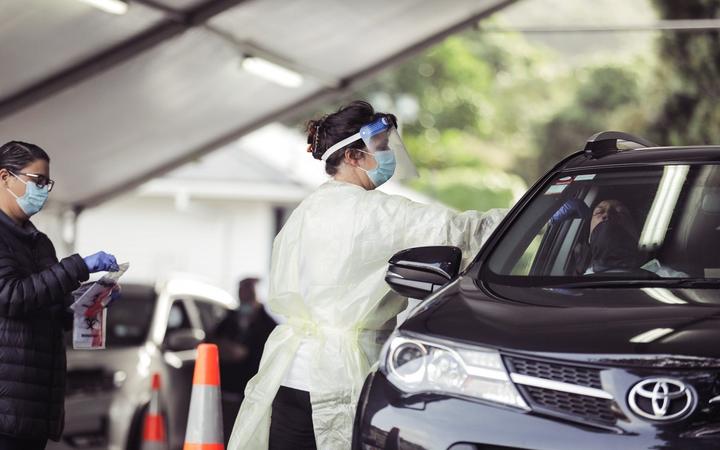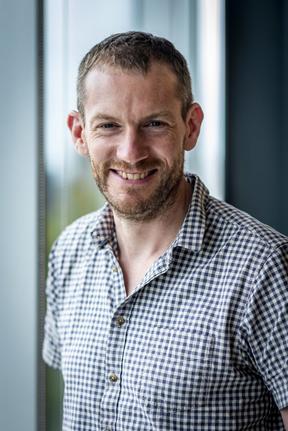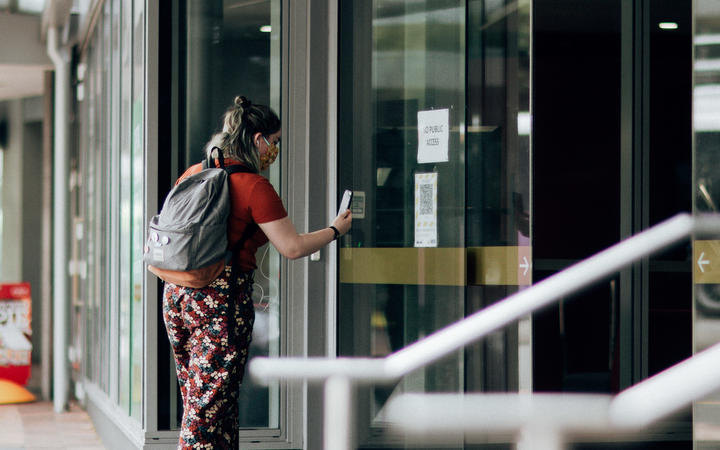Confirmation that a Sydney man’s partner is positive for the Delta variant means test results from locations the couple visited in Wellington towards the end of their stay are critical, a Covid-19 modeller says.
 Photo: RNZ / Samuel Rillstone
Photo: RNZ / Samuel Rillstone
The Sydney man was confirmed as infectious while he visited the city the weekend before last, prompting the government to announce that it was extending alert level 2 in the capital until 11.59pm on Tuesday.
 Covid-19 modeller Professor Michael Plank. Photo: Supplied.
Covid-19 modeller Professor Michael Plank. Photo: Supplied.
Covid-19 modeller Professor Michael Plank from the University of Canterbury said testing for the virus in Wellington remains a top priority.
But fewer than 700 people got tested in the region on Saturday, about the same time as when their symptoms might have started to appear.
Professor Plank told Morning Report that testing rates often drop a bit at the weekend and he is hopeful they will pick up again.
He said it was a significant development yesterday when it was announced that the Sydney man’s partner has tested positive.
The couple were apart from each other after they got home so it is most likely that the transmission took place while they were in New Zealand or on their way home.
“So that suggests that maybe the man was just at the very start of his infectious period while he was in New Zealand so that means we need to test everyone who was at those locations of interest towards the end of his stay because that’s probably now the highest risk for cases.”
It’s certainly possible cases will still arise in this country, Professor Plank said.
“I don’t think we are in the clear yet … it is very random, we’ve seen this before, and it may just be that he has infected his partner … but we do just need to do that testing to see if he has infected anyone else in New Zealand.”
Professor Michael Baker from the University of Otago told First Up the confirmation that the visitor’s partner has Covid-19 confirms the traveller was infectious at some point and “it raises the stakes a little more”.
The man’s trip to Wellington was a major exposure event, involved several indoor venues and would be a super-spreading episode if the Sydney man was infectious during that time.
“At the moment we would appear to be very lucky but we can’t guarantee that.”
It may be necessary to wait until the end of this week or even beyond that to be sure of no infections, Professor Baker said.
Speaking about the miner who has tested positive for the Delta variant in Townsville and 900 workers have already left the area, Professor Plank said it is a concerning situation.
It will be important for New Zealand officials to check the list of people and if anyone is found to have travelled here they will need to go into isolation as quickly as possible.
Greater Darwin has entered a 48-hour lockdown, and Professor Michael Plank says authorities here will need to move quickly if any of the workers have travelled to New Zealand.
He said if someone is identified, much will depend on their situation – whether they have been in isolation since leaving the mine or if they have moved about in the community.
Countries going backwards
Prof Baker said he is concerned for the Asia-Pacific region with several countries such as Australia, Taiwan and Fiji going backwards at present.
“This is a real lesson for us in New Zealand that everything we are doing now we are going to have to do better if we are going to stay ahead of this more infectious variant.”
His number one piece of advice is to stay home if you have cold or flu symptoms and get tested. After that, wearing masks indoors at level two and compulsory scanning are critical.
He said they don’t “muck around” in Sydney and Melbourne now and we shouldn’t either.
“They don’t even think about it – they just have to scan in and they know that”.
In Wellington fewer than 10 percent of people could be found at the start of the outbreak and that was unacceptable.
 Using a Covid Tracer app is second nature in Australia’s major cities unlike in New Zealand, Michael Baker says. (file pic) Photo: RNZ / Dom Thomas
Using a Covid Tracer app is second nature in Australia’s major cities unlike in New Zealand, Michael Baker says. (file pic) Photo: RNZ / Dom Thomas‘Tricky call’ on alert levels – Wiles
University of Auckland microbiologist Siouxsie Wiles said while test results from Wellington have been encouraging so far, it only takes one person and the virus can incubate for up to 14 days.
“The last thing we would want is everybody breathing a big sigh of relief and then later this week we end up with a positive case and it all kicks off.”
It was “a tricky call” to decide if Wellington should move out of alert level 2 after 11.59pm tomorrow.
“The important thing at the moment is that everybody around that case should be either in isolation or watching for symptoms … the trade-off is if we go down a level and then there is a case it may well mean that we have to do more than a level 2 to get back. So that’s a trade-off which is very difficult.”
The trans-Tasman bubble will need to stay paused for some time now that the Sydney cluster has spread all over Australia. As well, the Townsville mine case has also spread and may yet pose a risk if a New Zealand connection is found and a flight attendant who flew to several Australian cities has been confirmed as having the Delta variant.
Pre-flight testing provides small reassurance “but it’s not the silver bullet” and this has been proved by travellers who are tested before their flights but are later found to have Covid-19 while they are managed isolation and quarantine.
The Alpha variant stress tested the country’s Covid-19 systems and exposed shortfalls in aspects such as hotel ventilation and Delta is even more infectious, Wiles said.
“We might have to take different and more extreme measures to stop it from taking off. We’re seeing Delta now starting to cause third waves all over the place so we just have to be cautious.”
Wellington Mayor Andy Foster told First Up a large number of people were potentially exposed to the virus because of the Australian visitor, but if the region got through this without anyone being infected then it really would feel like “dodging a bullet”.
“Not just for Wellington, but probably for the country, because we had people flying around from Wellington Airport to all parts of the country.
“If we get out of this without there being any cases in the community, then it’ll be a sigh of relief, but we do need to keep on being vigilant because we are not post-Covid.”
He said testing capacity has expanded since the early days of alert level 2, where queues built up outside the testing sites and were fully booked.
“So actually what we really want now is for more people to go and get tested. If you think you were in proximity to our Australian guest, at those times and locations, then my encouragement would be to go and get tested.”
